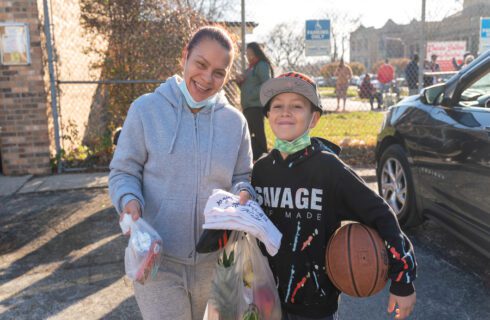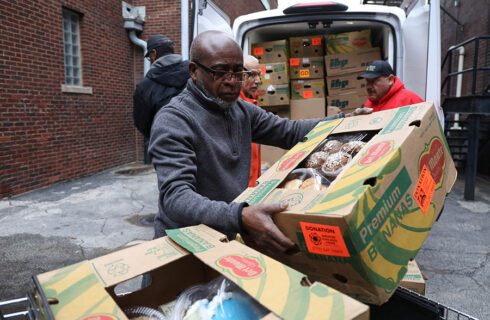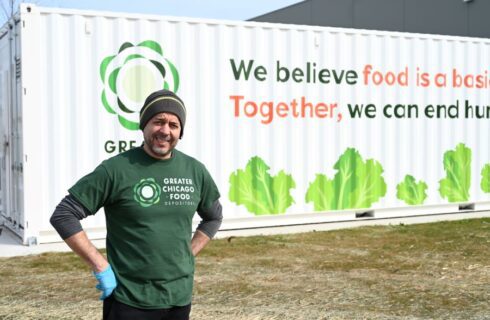Each day that passes without a working federal government presents a grim outlook for the millions of Americans that depend on federally-funded food assistance.
About two-thirds of the almost 40 million Americans who receive benefits through the Supplemental Nutrition Assistance Program (SNAP) are elderly, children or disabled. Many of them are also military veterans and working families. As of now, there’s no guarantee that they’ll receive their full benefits should the shutdown continue into March and beyond.
Though SNAP is funded through February, as announced by federal officials this week, it’s unclear at this point to what extent benefits would be funded in March.
“It’s a bit of a waiting game with millions of people hanging in balance,” said Robert Campbell, policy director for Feeding America, the national network of food banks of which the Food Depository is a member.
The importance of SNAP
The funding provision used by the U.S. Department of Agriculture, which oversees SNAP, to pay for February benefits can’t be used again for March, Campbell said. The USDA has not yet offered additional insights into how March benefits would be funded if the shutdown continues.
If SNAP benefits are disrupted or not administered in full – an unprecedented event – that would almost certainly lead to increased demand at food banks and soup kitchens in Chicago and throughout the U.S.
“The idea of SNAP not being fully funded is a big deal. It’s never happened before,” Campbell said.
To be clear, and despite our best efforts, the Food Depository and other anti-hunger charities would not be able to fill the void if our country’s most vulnerable citizens don’t receive the food assistance they need to be successful.
For every one meal provided by food banks nationally, SNAP benefits provide the equivalent of 12 meals, according to a Feeding America estimate.
At the local level, for every one meal provided by the Food Depository in Cook County, SNAP benefits provide the equivalent of eight meals, according to our own estimate based on data from fiscal year 2018.
In addition to distributing food to partner agencies and programs throughout Cook County, the Food Depository also connects people to SNAP benefits and advocates for policy that protects federal nutrition programs.
Our mission is to feed the hungry and to strive to end hunger.
That doesn’t happen without SNAP.
The shutdown is sowing confusion, causing hunger
Other impacts from the shutdown are already being felt. About 800,000 federal workers are either furloughed or working without pay. Many of them – such as TSA workers and Coast Guard service members, according to some media reports – are likely falling into debt and facing food insecurity for the first time.
We encourage them to seek food assistance, if needed, at one of the hundreds of food pantries within our network in Chicago and Cook County.
General confusion over what functions of the federal government are still in operation is likely preventing some people from even signing up for needed food assistance, Campbell said. Though people can still sign up for SNAP during the shutdown, they may assume otherwise.
And at least 2,500 retailers nationally that needed to reauthorize with the federal government in order to accept SNAP benefits now have to wait until the shutdown is resolved.
Frozen federal funding
Some federal funding to food banks is also frozen. Money distributed to food banks through The Emergency Food Assistance Program (TEFAP) for storage, distribution and administration is on hold during the government shutdown. The Food Depository was allocated $1.1 million for our fiscal year 2019, which runs from July to June, to administer TEFAP, as well as another $226,000 to purchase food through the Temporary Assistance for Needy Families (TANF) program.
We will not receive all of those funds until the shutdown is over. Food banks, large and small, over the country are similarly affected.
Funding for the Women, Infants and Children program – a vital program for many, though smaller than SNAP – is also uncertain beyond February.
The bottom line: The federal government shutdown is already increasing hunger in our communities.
And the longer it goes, the worse it will get.
We call on the White House and Senate leaders to end this unnecessary hardship for millions of Americans.
Visit our Advocacy page to sign up for action alerts on anti-hunger policy.
Share This Post



